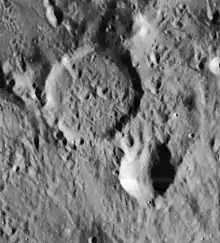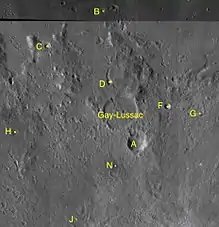Gay-Lussac (crater)
Gay-Lussac is a lunar impact crater located to the north of the prominent crater Copernicus, in the southern foothills of the Montes Carpatus range. The rim of the crater is slightly distorted, although generally circular. The inner floor is flat but rough, with no central peak. There are a pair of small craterlet depressions in the middle instead of a central peak. The associated crater Gay-Lussac A is nearly joined to the southeast rim.
 Lunar Orbiter 4 image of Gay-Lussac (upper left) and Gay-Lussac A (lower right) | |
| Coordinates | 13.9°N 20.8°W |
|---|---|
| Diameter | 26 km |
| Depth | 0.8 km |
| Colongitude | 21° at sunrise |
| Eponym | Joseph L. Gay-Lussac |
The crater is named after French physicist Joseph Louis Gay-Lussac.[1]
To the southwest is a wide rille named Rima Gay-Lussac. This is a nearly linear formation with curves at the end. It follows a 40-km-long line from the southwest to the northeast.
Satellite craters

By convention these features are identified on lunar maps by placing the letter on the side of the crater midpoint that is closest to Gay-Lussac.
| Gay-Lussac | Latitude | Longitude | Diameter |
|---|---|---|---|
| A | 13.2° N | 20.4° W | 15 km |
| B | 16.2° N | 21.1° W | 3 km |
| C | 15.4° N | 22.5° W | 5 km |
| D | 14.6° N | 21.0° W | 5 km |
| F | 14.0° N | 19.6° W | 5 km |
| G | 13.8° N | 18.9° W | 5 km |
| H | 13.4° N | 23.2° W | 5 km |
| J | 11.7° N | 21.7° W | 3 km |
| N | 12.6° N | 20.9° W | 2 km |
References
- "Gay-Lussac (crater)". Gazetteer of Planetary Nomenclature. USGS Astrogeology Research Program.
- Andersson, L. E.; Whitaker, E. A. (1982). NASA Catalogue of Lunar Nomenclature. NASA RP-1097.CS1 maint: ref=harv (link)
- Bussey, B.; Spudis, P. (2004). The Clementine Atlas of the Moon. New York: Cambridge University Press. ISBN 978-0-521-81528-4.CS1 maint: ref=harv (link)
- Cocks, Elijah E.; Cocks, Josiah C. (1995). Who's Who on the Moon: A Biographical Dictionary of Lunar Nomenclature. Tudor Publishers. ISBN 978-0-936389-27-1.CS1 maint: ref=harv (link)
- McDowell, Jonathan (July 15, 2007). "Lunar Nomenclature". Jonathan's Space Report. Retrieved 2007-10-24.CS1 maint: ref=harv (link)
- Menzel, D. H.; Minnaert, M.; Levin, B.; Dollfus, A.; Bell, B. (1971). "Report on Lunar Nomenclature by the Working Group of Commission 17 of the IAU". Space Science Reviews. 12 (2): 136–186. Bibcode:1971SSRv...12..136M. doi:10.1007/BF00171763.CS1 maint: ref=harv (link)
- Moore, Patrick (2001). On the Moon. Sterling Publishing Co. ISBN 978-0-304-35469-6.CS1 maint: ref=harv (link)
- Price, Fred W. (1988). The Moon Observer's Handbook. Cambridge University Press. ISBN 978-0-521-33500-3.CS1 maint: ref=harv (link)
- Rükl, Antonín (1990). Atlas of the Moon. Kalmbach Books. ISBN 978-0-913135-17-4.CS1 maint: ref=harv (link)
- Webb, Rev. T. W. (1962). Celestial Objects for Common Telescopes (6th revised ed.). Dover. ISBN 978-0-486-20917-3.CS1 maint: ref=harv (link)
- Whitaker, Ewen A. (1999). Mapping and Naming the Moon. Cambridge University Press. ISBN 978-0-521-62248-6.CS1 maint: ref=harv (link)
- Wlasuk, Peter T. (2000). Observing the Moon. Springer. ISBN 978-1-85233-193-1.CS1 maint: ref=harv (link)
External links
| Wikimedia Commons has media related to Gay-Lussac (crater). |